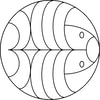Technology is defined as the knowledge and practices, based on scientific principles, in a technical domain. As such, ancient technologies have nothing to envy modern technologies. They are no less efficient in their purpose, they are just older. The main quality of those technologies called primitive is that they can be made without depending on anything else than raw materials and craftsmanship. In the past, they were perfectly adapted to the way of life that nature imposed. Science was not written but rather experienced on a daily basis with the physical and chemical principles that allowed people to transform animal, plant and mineral materials into tools of subsistence. The knowledge was passed from one generation to the next by practice and improved by experimentation. Over thousands of years, aboriginal technologies have achieved a degree of sophistication that challenges archaeology. Learn more
Aboriginal refers to the descendants of the first human groups to settle the American continent during the Ice Age between 40,000 and 12,000 years ago after several land and maritime migrations from Asia. These first nomadic people living from hunting, fishing and gathering brought with them knowledge and technologies that allowed them to adapt to different environments and develop new traditions to become over several millennia a multitude of culturally distinct groups. In Quebec, there are today 11 aboriginal nations divided into three linguistic groups: Iroquoians, Algonquians and Inuit (which arrived as a separate migration). Learn more
Archaeology is a scientific discipline seeking to understand past human societies through the study of material remains. The study of ancient technologies benefits particularly from an experimental approach. Experimental archaeology is a research method specialized in the replication of past objects and behaviors to understand the processes involved in making and using artifacts found in archaeological sites or preserved in museums and verify hypotheses that cannot be tested in a laboratory. For academic purposes, these experiments are systematically documented to later serve the scientific community. For educational purposes, the results are converted into courses, conferences, exhibitions, demonstrations and workshops to be presented to the public. Learn more
Our mission is mainly educational and aims to provide the general public with a more practical vision of the past and a better understanding of aboriginal technoligies of North America through experimentation. Learn more
Aboriginal refers to the descendants of the first human groups to settle the American continent during the Ice Age between 40,000 and 12,000 years ago after several land and maritime migrations from Asia. These first nomadic people living from hunting, fishing and gathering brought with them knowledge and technologies that allowed them to adapt to different environments and develop new traditions to become over several millennia a multitude of culturally distinct groups. In Quebec, there are today 11 aboriginal nations divided into three linguistic groups: Iroquoians, Algonquians and Inuit (which arrived as a separate migration). Learn more
Archaeology is a scientific discipline seeking to understand past human societies through the study of material remains. The study of ancient technologies benefits particularly from an experimental approach. Experimental archaeology is a research method specialized in the replication of past objects and behaviors to understand the processes involved in making and using artifacts found in archaeological sites or preserved in museums and verify hypotheses that cannot be tested in a laboratory. For academic purposes, these experiments are systematically documented to later serve the scientific community. For educational purposes, the results are converted into courses, conferences, exhibitions, demonstrations and workshops to be presented to the public. Learn more
Our mission is mainly educational and aims to provide the general public with a more practical vision of the past and a better understanding of aboriginal technoligies of North America through experimentation. Learn more
